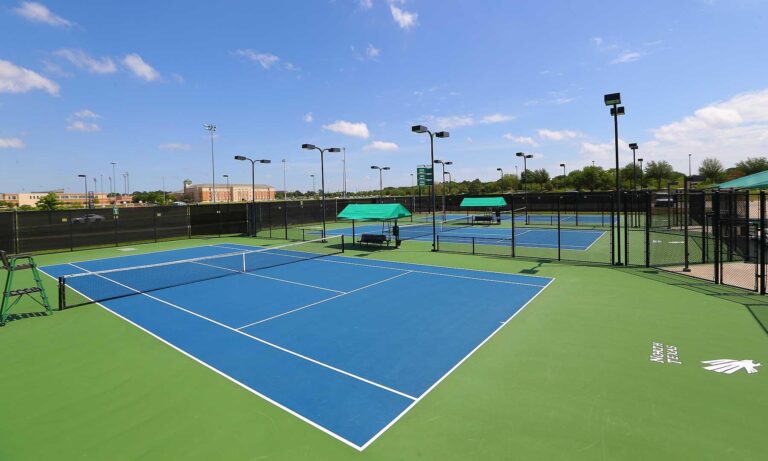North Texas Men’s Tennis Succumbs to Houston in Intense Regional Showdown
The University of North Texas men’s tennis squad encountered a challenging weekend as they narrowly lost to their regional adversaries from Houston. Despite demonstrating commendable skill and determination, the Mean Green were unable to clinch the win, revealing critical areas that require refinement as the season advances. This defeat highlights the fierce competitiveness that defines collegiate tennis within the region.
During the match held in Houston, UNT battled fiercely but faltered during pivotal moments, especially in the closing sets. The team’s doubles pairs exhibited flashes of exceptional teamwork and tactical net play, thrilling the audience. However, Houston’s ability to seize key break points ultimately tipped the scales in their favor.
Coach emphasized the importance of learning from this experience and outlined several focal points for the team’s development:
- Building stronger mental resilience to handle pressure-packed situations.
- Enhancing first-serve accuracy to establish early dominance in matches.
- Improving communication and coordination in doubles to minimize avoidable mistakes.
| Statistic | University of North Texas | Houston |
|---|---|---|
| Singles Matches Won | 2 | 4 |
| Doubles Matches Won | 1 | 2 |
| Unforced Errors | 12 | 8 |
| Aces Served | 5 | 7 |
Impact Players and Defining Moments That Influenced the Result
Key contributors from both teams played decisive roles throughout the contest. UNT’s sophomore standout, Alex Ramirez, demonstrated exceptional grit by securing a vital singles victory that kept the Mean Green competitive. On the other side, Houston’s experienced doubles duo, Johnson and Patel, showcased impeccable synergy, clinching the doubles point early and setting a commanding tone. Their aggressive net approaches and pinpoint serving consistently pressured UNT’s lineup, inducing critical errors at crucial junctures.
The match’s momentum swung on several strategic and physically demanding exchanges. A particularly intense 18-shot rally in the third set, won by Houston’s Thomas Lee, proved pivotal in shifting control. The crowd’s enthusiasm peaked during these exchanges, underscoring their significance in disrupting UNT’s rhythm. Below is a summary of key game-changing factors:
- Double Fault Challenges: UNT struggled with serve reliability, committing seven double faults throughout the match.
- Break Point Efficiency: Houston capitalized on 4 out of 6 break point chances, exploiting UNT’s defensive vulnerabilities.
- Baseline Control: Houston dominated 65% of extended baseline rallies exceeding 10 strokes.
| Player | Singles Record | Doubles Record | Notable Contribution |
|---|---|---|---|
| Alex Ramirez (UNT) | 1-1 | 0-0 | Crucial singles victory |
| Thomas Lee (Houston) | 2-0 | 1-0 | Dominated baseline rallies |
| Johnson/Patel (Houston) | 0-0 | 1-0 | Secured doubles point |
| Jordan Morales (UNT) | 0-2 | 0-1 | Strong defensive efforts under pressure |
Tactical Gaps and Overlooked Opportunities
The recent encounter in Houston exposed several tactical weaknesses within the University of North Texas men’s tennis team. While individual talent shone intermittently, the squad struggled to sustain consistency during critical phases. Failure to convert break points and a high count of unforced errors significantly hindered their ability to build momentum. Houston’s aggressive net play and sharp baseline strokes further exploited UNT’s challenges in adapting strategies mid-match.
Particularly in doubles, early leads were lost due to lapses in focus and communication. UNT’s heavy reliance on baseline rallies limited their offensive versatility, making their approach predictable and easier to counter. The following statistics illustrate these strategic shortcomings:
| Metric | UNT Performance | Opponent Performance |
|---|---|---|
| Break Point Conversion Rate | 12% | 45% |
| First Serve Success Rate | 58% | 72% |
| Net Approaches Won | 41% | 63% |
- Insufficient aggression during decisive moments led to lost opportunities.
- Limited shot variety made the team’s tactics foreseeable.
- Communication breakdowns in doubles pairings cost critical points.
Strategies to Enhance Team Performance in Upcoming Matches
To sharpen the team’s competitive edge, it is essential to cultivate a resilient mindset and improve communication dynamics both on and off the court. Incorporating regular tactical review sessions with coaching staff can deepen players’ understanding of opponents’ tendencies. Additionally, mental conditioning programs will equip athletes to better handle pressure during high-stakes moments. Tailored skill development clinics focusing on individual weaknesses and reinforcing strengths will be crucial for achieving a balanced and formidable team.
Priority Areas for Development:
- Conducting intensive match simulations to enhance adaptability under varying conditions.
- Expanding video analysis sessions to provide immediate, actionable feedback.
- Organizing team-building activities to strengthen player unity and on-court synergy.
| Focus Area | Current Approach | Recommended Improvement |
|---|---|---|
| Training Intensity | Moderate | High-intensity, performance-driven drills |
| Communication | Basic | Structured and consistent on-court communication protocols |
| Mental Toughness | Occasional | Regularly scheduled resilience and focus training |
Conclusion: Looking Ahead for UNT Men’s Tennis
The University of North Texas men’s tennis team’s recent narrow defeat in Houston serves as a valuable learning experience amid a highly competitive season. Although the outcome was disappointing, the lessons gleaned from this match will be instrumental as the Mean Green strive to improve and rebound in future contests. Supporters can anticipate a more cohesive and strategically versatile team in the weeks ahead as UNT works diligently to elevate their game.




